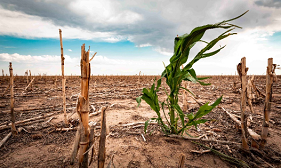The southern African region is experiencing one of its worst drought in decades, and millions are facing extreme food insecurity and water shortages, amidst a growing climate crisis, fueled by the El Niño weather phenomenon.
Before the start of the 2023/24 agricultural season, Malawi, Mozambique, Zambia and Zimbabwe, all countries severely affected by this crisis, made the critical decision to participate in ARC risk pools for drought. Based on early projections from ARC’s season monitoring tools, all four countries are likely to receive insurance payouts, and this will be confirmed at the end of the season.
The risk pools, run by ARC Limited, the insurance affiliate of the ARC Group responsible for risk pooling and transfer, avail timely funds to facilitate early response to a disaster event.
‘The drought is hitting at a time of significant protracted unmet needs, with alarming food insecurity and malnutrition levels, and funding shortages that have stalled humanitarian activities,’ says Menghesab Haile. ‘The drought has decimated livelihoods across southern Africa. The El Niño weather phenomenon serves as a poignant reminder of the climate crisis – and how urgent it is to scale up investment in activities that build resilience. Communities must be empowered with climate adaptation skills that will enable them to mitigate, reduce, and absorb the effects of climate shocks.’
As part of the ARC Replica program, an initiative that allows humanitarian actors to take out insurance on behalf of a country, Replica partners for the four countries: World Food Program, StartNetwork and UN Refugee Agency (UNHCR) are also likely to receive a payout. Not only does this program complement other response activities from the countries, but it goes a long way towards increasing the resources to reach vulnerable populations.
In preparation for the end of the agricultural season, ARC, together with the in-country Technical Working Groups of the four countries, are in the process of finalizing the Final Implementation Plans (FIP), a document that clearly outlines the use of an ARC payout ahead of the end of season. This is part of the ARC contingency planning process initiated before the start of a season.
“This is a region we have assisted with significant drought payouts in the past. In 2022, we paid out to $14.2 million to Malawi’s Replica partner, the World Food Program; $5.3 million to Zambia and $1,4 million to Zimbabwe’, said Lesley Ndlovu, CEO of ARC Limited. ‘The impact of disaster events goes beyond the immediate socio-economic costs and in the absence of instruments such as ARC, disaster such as drought can easily trap vulnerable populations into perpetual cycles of poverty. It is our honour work closely with the four countries’ Disaster Risk Management structures and contribute to their resilience building efforts. It is moments like these when we can demonstrate the true impact of our work.”
This crisis underscores the importance of instruments such as the ARC solution in building resilience and facilitating recovery efforts. It also emphasizes the value of collaborations between partners to support Africa’s resilience building efforts.
ARC, as a specialised Agency of the African Union, works with AU member states to strengthen their preparedness to respond to such threats. The ARC mechanism combines four critical elements of disaster preparedness: early warning, contingency planning, risk pooling and risk transfer to create a powerful value proposition that has proven effective in strengthening a government’s ability to manage disaster events.
